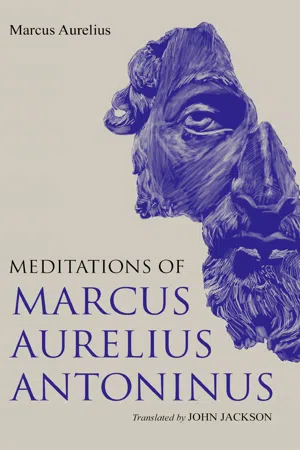
- English
- ePUB (mobile friendly)
- Available on iOS & Android
Meditations of Marcus Aurelius Antoninus
About this book
Marcus Aurelius was the last of the Five Good Emperors of the Roman Empire, and he is known for his military victories, for his contribution to Stoic philosophy, and for his diary. This is that diary, which was published after his death, Meditations of Marcus Aurelius Antoninus.
Aurelius offers a logical yet insightful approach to topics such as mortality, how to cultivate internal peace and strength, and the importance of focusing on your decisions and not the actions of others, as well as other personal issues that are familiar to us all.
The introduction offers a background of the Emperor's life and provides an insight into a man who is torn in two directions. Aurelius is described as "a sovereign whose conscience draws him in one direction, while fortune drives him to tread the opposite path." It is from this point of internal struggle that Aurelius writes, so as to gain a better sense of himself. And with him the reader is able to explore their own life, desire, and spirituality.
Frequently asked questions
- Essential is ideal for learners and professionals who enjoy exploring a wide range of subjects. Access the Essential Library with 800,000+ trusted titles and best-sellers across business, personal growth, and the humanities. Includes unlimited reading time and Standard Read Aloud voice.
- Complete: Perfect for advanced learners and researchers needing full, unrestricted access. Unlock 1.4M+ books across hundreds of subjects, including academic and specialized titles. The Complete Plan also includes advanced features like Premium Read Aloud and Research Assistant.
Please note we cannot support devices running on iOS 13 and Android 7 or earlier. Learn more about using the app.
Information
CRITICAL NOTES
BOOK I.
BOOK II.
BOOK III.
BOOK IV.
Table of contents
- Introduction
- BOOK I
- BOOK II
- BOOK III
- BOOK IV
- BOOK V
- BOOK VI
- BOOK VII
- BOOK VIII
- BOOK IX
- BOOK X
- BOOK XI
- BOOK XII
- NOTES
- CRITICAL NOTES